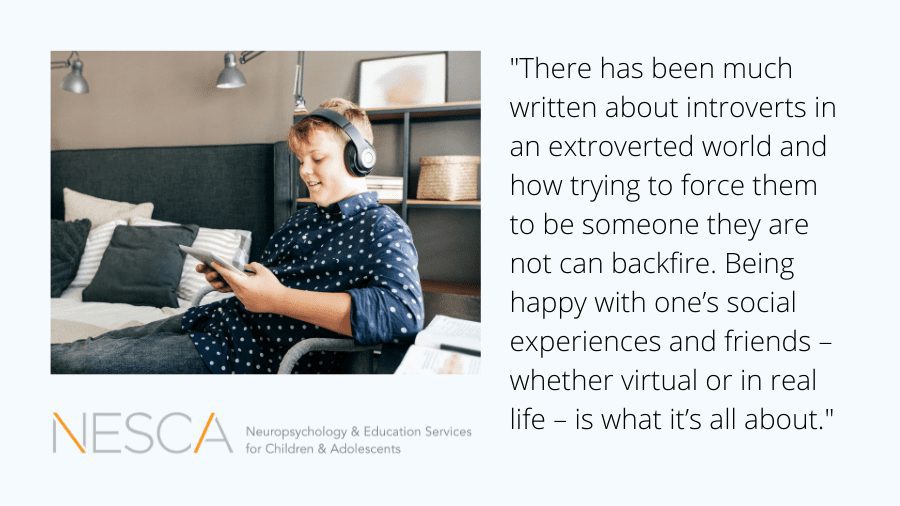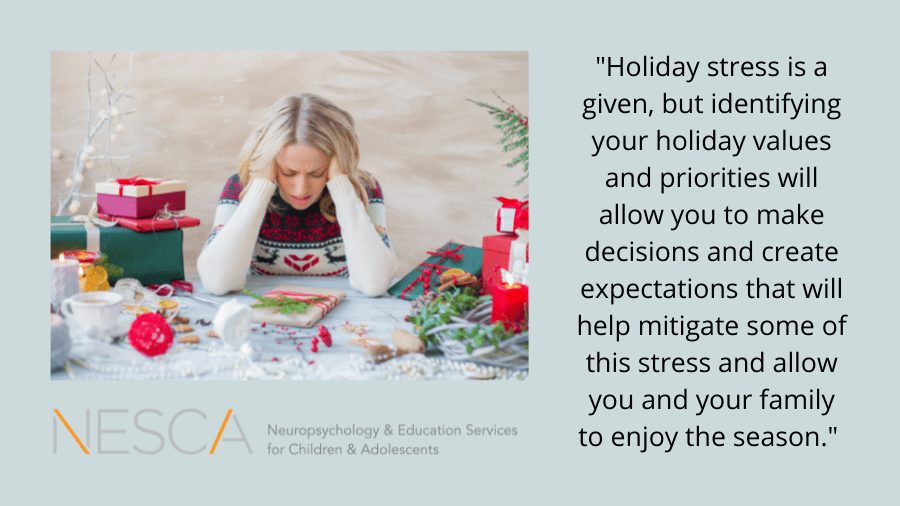
 By Dot Lucci, M.Ed., CAGS
By Dot Lucci, M.Ed., CAGS
Director of Consultation and Psychoeducational Services, NESCA
Many parents want their children to have friends and a social life, yet are concerned about the quality of their child’s social life. They often describe their child’s afterschool hours as being occupied with screen time, which may actually include others. Other children may be engaged in structured activities, such as scouts, sports, school-based clubs (i.e., robotics), music lessons, gaming clubs, and more. Then there are the children that tire easily when around many people and prefer alone time or being around one or two friends. When children are asked if they have friends, they often say yes and that they are online friends. These children who are engaged in structured social activities, online gaming, and other online activities say they have satisfying social lives. So, who’s to judge? A person’s definition of a satisfying social life is for each of us to decide (so long as they are doing so safely and responsibly).
When it comes to defining friends and a social life, there is often a disconnect between a child or teen’s definition and that of their parents. Today, there are so many more ways to have friends, a social life and socialize than there were “when we were kids.” Having a social life is now defined more broadly, such as online friends, gaming friends, the number of followers on Instagram/Twitter, and so much more.
A “virtual friend” or “online friend” is someone who one connects with online. These virtual friends are often very connected to others and can even become BFVs (best friends virtually). In the “old days” before the internet, these friends would have been called “pen pals,” whereby letters were written and exchanged. These pen pals of old sometimes heard all the trials and tribulations of one’s life. Virtual friends (VF) may stay as that – you may or may not ever meet them, which doesn’t diminish the relationship or make it less important and meaningful. IRLs (in real life friends) are people who one connects with in-person or in real-time. Many times, children and teens have better and stronger VFs than IRL friends. And sometimes they do meet up at different events, such as: E3 Expo, PAX, gaming clubs, Comic-Con and many more.
Socializing is different for each of us. How do we respect our children’s personalities and choices regarding socializing while encouraging them to explore more and different friendships and experiences? There are “introverts” and “extroverts” amongst us. Many extroverts love socializing both in real life and virtually and have many friends. They get energized by being around others. They’ll text a friend(s) and invite them over with no plan on what to do other than hang out. They care little about planning, predictability, and are okay going with the flow, handling ambiguity and uncertainty. Introverts are more comfortable with alone time, structure, predictability, clear boundaries, and rules/guidelines when engaging with others. Often times these kids are more comfortable with VFs and the online world with its structured platforms, anonymity, and being able to participate/not participate on their terms. Many of these kids are often the leaders and moderators on virtual platforms – something you may not suspect given their presentation in real-time/real life.
In this new world of online social connection, it is best to not try to force your child into being an “in real life socializer,” and involved in many social activities but instead make sure they have the social skills and knowledge to be successful in the real world of school, work, and community. Be aware of what and whom your children are connecting with online and accept who they are as a person. Trying to force them to be someone they are not may lead to more mental health challenges than them only having VFs or only engaging with IRL friends occasionally or on their terms. A satisfying social life is a personal choice and one that can’t be forced. There are many adults who are happy with one or two IRL friends and have structured activities they participate in (i.e., book club, trivia night, etc.); yet have many more VFs in their online platforms.
There has been much written about introverts in an extroverted world and how trying to force them to be someone they are not can backfire. Being happy with one’s social experiences and friends – whether virtual or in real life – is what it’s all about.
References
https://www.parents.com/kids/development/shy/raising-an-introvert-in-an-extrovert-world/
https://www.pewresearch.org/internet/2015/08/06/chapter-4-social-media-and-friendships/
https://www.pewresearch.org/internet/2018/11/28/teens-friendships-and-online-groups/
About the Author
NESCA’s Director of Consultation and Psychoeducational Services Dot Lucci has been active in the fields of education, psychology, research and academia for over 30 years. She is a national consultant and speaker on program design and the inclusion of children and adolescents with special needs, especially those diagnosed with Autism Spectrum Disorder (ASD). Prior to joining NESCA, Ms. Lucci was the Principal of the Partners Program/EDCO Collaborative and previously the Program Director and Director of Consultation at MGH/Aspire for 13 years, where she built child, teen and young adult programs and established the 3-Ss (self-awareness, social competency and stress management) as the programming backbone. She also served as director of the Autism Support Center. Ms. Lucci was previously an elementary classroom teacher, special educator, researcher, school psychologist, college professor and director of public schools, a private special education school and an education collaborative.
and academia for over 30 years. She is a national consultant and speaker on program design and the inclusion of children and adolescents with special needs, especially those diagnosed with Autism Spectrum Disorder (ASD). Prior to joining NESCA, Ms. Lucci was the Principal of the Partners Program/EDCO Collaborative and previously the Program Director and Director of Consultation at MGH/Aspire for 13 years, where she built child, teen and young adult programs and established the 3-Ss (self-awareness, social competency and stress management) as the programming backbone. She also served as director of the Autism Support Center. Ms. Lucci was previously an elementary classroom teacher, special educator, researcher, school psychologist, college professor and director of public schools, a private special education school and an education collaborative.
Ms. Lucci directs NESCA’s consultation services to public and private schools, colleges and universities, businesses and community agencies. She also provides psychoeducational counseling directly to students and parents. Ms. Lucci’s clinical interests include mind-body practices, positive psychology, and the use of technology and biofeedback devices in the instruction of social and emotional learning, especially as they apply to neurodiverse individuals.
To book a consultation with Ms. Lucci or one of our many expert neuropsychologists, complete NESCA’s online intake form. Indicate whether you are seeking an “evaluation” or “consultation” and your preferred clinician/consultant in the referral line.
Neuropsychology & Education Services for Children & Adolescents (NESCA) is a pediatric neuropsychology practice and integrative treatment center with offices in Newton, Massachusetts, Plainville, Massachusetts, and Londonderry, New Hampshire, serving clients from preschool through young adulthood and their families. For more information, please email info@nesca-newton.com or call 617-658-9800.

